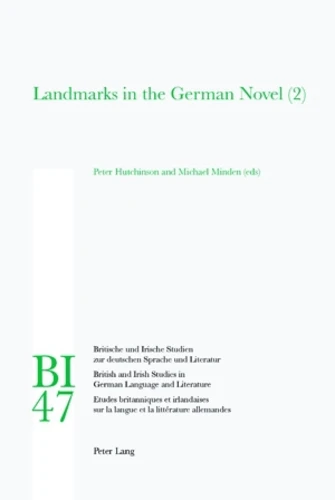Landmarks in the German Novel (2)
Par : ,Formats :
- Paiement en ligne :
- Livraison à domicile ou en point Mondial Relay indisponible
- Retrait Click and Collect en magasin gratuit
- Nombre de pages164
- ISBN978-3-03911-566-2
- EAN9783039115662
- Date de parution01/12/2009
- CollectionBritische und Irische Studien
- ÉditeurPeter Lang
Résumé
The nine essays in this volume deal with major achievements in the German novel since 1959. They range from the very well known, such as Brussig's Helden wie wir, an extravagant treatment of life under the Stasi and the fall of the Berlin Wall, to the much more recondite, such as Hubert Fichte's Detlevs Imitationen "Grünspan", one of the first, and most important, products of the abolition of the discrimination against gays in 1969.
What is most surprising about this collection is that, in contrast to the majority of successful novels written in German before 1959, only one of these is by a clearly ‘West' German author : Hubert Fichte. There is, by contrast, a surprising number who have their roots in the GDR (Plenzdorf, Wolf, Brussig, Schulze), or in Austria (Bachmann, Bernhard). This is also a period in which women writers emerge powerfully (Bachmann, Wolf, and Özdamar).
Virtually all these novels aroused controversy in some quarters at the time of their publication, often for their treatment of semi-taboo, or at least uncomfortable, subject-matter. These essays, all by specialists in the relevant field, were originally delivered as lectures in the University of Cambridge.
What is most surprising about this collection is that, in contrast to the majority of successful novels written in German before 1959, only one of these is by a clearly ‘West' German author : Hubert Fichte. There is, by contrast, a surprising number who have their roots in the GDR (Plenzdorf, Wolf, Brussig, Schulze), or in Austria (Bachmann, Bernhard). This is also a period in which women writers emerge powerfully (Bachmann, Wolf, and Özdamar).
Virtually all these novels aroused controversy in some quarters at the time of their publication, often for their treatment of semi-taboo, or at least uncomfortable, subject-matter. These essays, all by specialists in the relevant field, were originally delivered as lectures in the University of Cambridge.
The nine essays in this volume deal with major achievements in the German novel since 1959. They range from the very well known, such as Brussig's Helden wie wir, an extravagant treatment of life under the Stasi and the fall of the Berlin Wall, to the much more recondite, such as Hubert Fichte's Detlevs Imitationen "Grünspan", one of the first, and most important, products of the abolition of the discrimination against gays in 1969.
What is most surprising about this collection is that, in contrast to the majority of successful novels written in German before 1959, only one of these is by a clearly ‘West' German author : Hubert Fichte. There is, by contrast, a surprising number who have their roots in the GDR (Plenzdorf, Wolf, Brussig, Schulze), or in Austria (Bachmann, Bernhard). This is also a period in which women writers emerge powerfully (Bachmann, Wolf, and Özdamar).
Virtually all these novels aroused controversy in some quarters at the time of their publication, often for their treatment of semi-taboo, or at least uncomfortable, subject-matter. These essays, all by specialists in the relevant field, were originally delivered as lectures in the University of Cambridge.
What is most surprising about this collection is that, in contrast to the majority of successful novels written in German before 1959, only one of these is by a clearly ‘West' German author : Hubert Fichte. There is, by contrast, a surprising number who have their roots in the GDR (Plenzdorf, Wolf, Brussig, Schulze), or in Austria (Bachmann, Bernhard). This is also a period in which women writers emerge powerfully (Bachmann, Wolf, and Özdamar).
Virtually all these novels aroused controversy in some quarters at the time of their publication, often for their treatment of semi-taboo, or at least uncomfortable, subject-matter. These essays, all by specialists in the relevant field, were originally delivered as lectures in the University of Cambridge.

